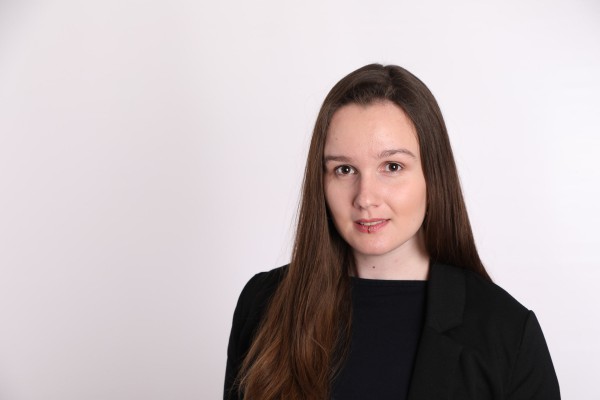Charlotte Müller
Interview by Carey Sargent, EPFL, NCCR MARVEL
Have you always been interested in science?
No, absolutely not. I wanted to be a musician for most of my teenage life. I sing and went to the high school with the music concentration. I always liked math but because of my experiences in middle school, I absolutely hated chemistry when I got to high school and was therefore very bad at it. My teacher there was great though and he basically changed everything. In three years I went from not passing exams in chemistry to wanting to study it at university. I decided not to study music because I don’t really like the spotlight and I thought that it would be better to study chemistry and have music as a hobby, rather than studying music and having chemistry as a hobby.

How did you find out about INSPIRE Potentials?
I took a lecture with Professor Hutter and he told us about it. I’d planned to do my Master’s thesis with him anyway because he was highly recommended to me by my bachelor thesis supervisor in Bern. Therefore, since he is part of this program and it is a great cause as well, I decided to apply.
What is your Master’s project on?
I am doing a bit of programming in the software that the group of Prof. Hutter mainly developed called CP2K. I’m just doing a little side thing. I’m programming something that can calculate the localization of orbitals. To do that, you need to do some matrix transformation, which is usually computationally very costly and therefore, there exist multiple algorithms to do it. Some of them are already implemented and some are not, so that’s what I’m doing right now.
The best part of the experience is that the people are great and I can always talk to them but I am still getting a lot of freedom. I’m doing something that no one else in the group works on currently. I think that’s very cool, because I know that this part of the code was really just me.
Would you like to continue on to do a PhD?
I would like to do a PhD and I am kind of looking around right now. I’m just very interested in in learning a bit more about the quantum world before going into the professional world.
Do you think women scientists face any particular challenges?
I think nowadays it depends on the group you are working in. In most of the groups I’ve experienced I was treated equally, but I think it’s probably not always like this.
Another challenge that females often face in general is that women are usually more perfectionistic in the sense that they want to do a really good job. Therefore, if they have a doubt if they are qualified enough for a position, they’d rather not apply at all while a male colleague might just go for it. Obviously, this doesn’t apply to all women, but definitely to me and also to multiple friends of mine.
I would therefore advice any girl (or any person that is unsure about what to do), to just try whatever seems most interesting to you, and if you drop out, it’s not that bad, just do something else. The work you’ve done will still give you experience of some kind and it’s therefore never a lost year.
What advice would you give to younger students?
For me, the hardest part has been just not knowing everything that is out there, everything that I could do. So, I guess if I could go back and say something to my younger self, or actually to anybody, it would be to inform yourself very well, ask questions (even if that is sometimes very scary). And also, if the only reason you don’t want to do something, is because you think maybe you’re not good enough, just try it. You will see - maybe you are, maybe you’re not. And if you are not you still have met new people and gained experience that might give you an advantage in your future in another field.
